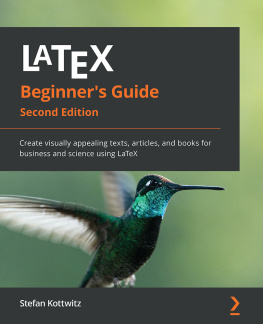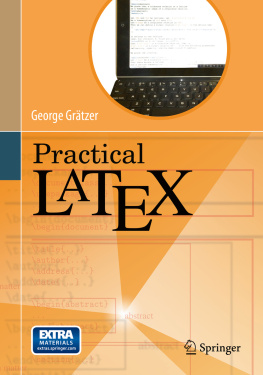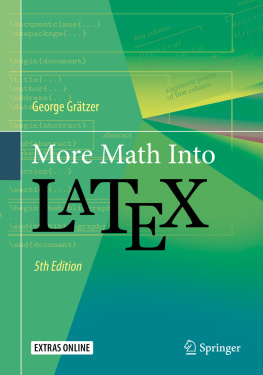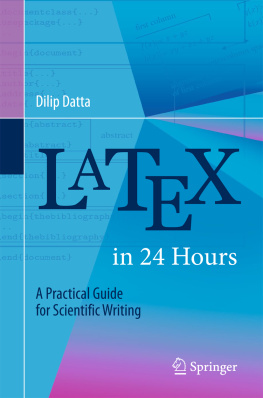Frank Mittelbach - The LaTeX Companion
Here you can read online Frank Mittelbach - The LaTeX Companion full text of the book (entire story) in english for free. Download pdf and epub, get meaning, cover and reviews about this ebook. year: 2004, publisher: Addison-Wesley Professional, genre: Computer. Description of the work, (preface) as well as reviews are available. Best literature library LitArk.com created for fans of good reading and offers a wide selection of genres:
Romance novel
Science fiction
Adventure
Detective
Science
History
Home and family
Prose
Art
Politics
Computer
Non-fiction
Religion
Business
Children
Humor
Choose a favorite category and find really read worthwhile books. Enjoy immersion in the world of imagination, feel the emotions of the characters or learn something new for yourself, make an fascinating discovery.

- Book:The LaTeX Companion
- Author:
- Publisher:Addison-Wesley Professional
- Genre:
- Year:2004
- Rating:5 / 5
- Favourites:Add to favourites
- Your mark:
- 100
- 1
- 2
- 3
- 4
- 5
The LaTeX Companion: summary, description and annotation
We offer to read an annotation, description, summary or preface (depends on what the author of the book "The LaTeX Companion" wrote himself). If you haven't found the necessary information about the book — write in the comments, we will try to find it.
The LaTeX Companion — read online for free the complete book (whole text) full work
Below is the text of the book, divided by pages. System saving the place of the last page read, allows you to conveniently read the book "The LaTeX Companion" online for free, without having to search again every time where you left off. Put a bookmark, and you can go to the page where you finished reading at any time.
Font size:
Interval:
Bookmark:
The eBook production of The LaTeX Companion, Second Edition, is based on the camera-ready PDF copy of the printed book. From this PDF source an ePUB document was produced (from which in turn the mobi format was compiled for Amazon Kindle devices). While the text was kept unchanged, the content was enhanced during this transformation with appropriate links in various places, for example, to chapters, sections, figures, examples, and bibliography entries, and from the index back into the book.
All examples and multi-line code fragments have been treated as images to ensure that they correctly show the input and its typeset result (without being garbled by text reflow). The downside of this approach is that material within the examples is not directly searchable through full text search (except for the PDF version of the book), but after a number of different trials I felt that this was the best compromise possible to ensure a pleasant reading experience. After all, all important commands are typically nearby in the text (where they will be found by search) and all examples are fully indexed and cross-referenced.
One other challenging typographical detail was the treatment of the side notes that highlight important aspects in the book, a device used fairly regularly in the printed version. Because the eBook reader screens (except perhaps on large tablets) are too narrow to allow for large margins a different solution had to be found. After some experiments we settled on displaying the side notes as indented headings in an italic font, which I feel works well without being intrusive; judge for yourself. In the same way, the example numbers moved from the margin to the center preceding the example.
Due to the reuse of the original text this eBook edition has a few idiosyncrasies that the reader should be aware of. For one, textual references often refer to see section X on page Y, but only some eBook readers display the original page number. Others show only a reading position because page numbers have no direct meaning in this reflowable format. However, all such references are correctly linked, so if you follow the underlying link, you will navigate to the appropriate place. There are a few other places where the origin of the text shines through: as well as in many LaTeX installations.
ePUB is an open, industry-standard format for eBooks. However, support of ePUB and its many features varies across reading devices and applications. I personally tested both ePUB and mobi format of the book on a number of different devices and each and every one behaved slightly differently. Thus, to get the best reading experience you probably will have to customize the presentation to your liking using the features of your particular device or application.
On many devices the original book fonts will be shown (they work fairly nicely on screens) but on some devices a sans serif font is used by default. In that case the font menu of your reader is your friend. My experience was that on most devices, portrait mode works fine, especially if the device supports tap or click to enlarge a graphic. However, if the display on your device is too small, switching to landscape mode might be the better choice. For details on this and other customization possibilities, consult your reader or app manual. I certainly learned a lot during the development of this eBook about the different ways readers use the back button, hide the customization menus, and so on.
When we wrote the original book, we were convinced that it could never be adapted to an eBook, because of the complexity of its content. After several people asked us about an eBook version, we finally thought to give it a try, with the clear target to provide an eBook only if we felt comfortable with the quality. To be honest, the result has surprised me; it is far better than I thought it could ever get.
Enjoy.
Frank Mittelbach
Mainz, September 2013
Second Edition
Frank Mittelbach
LaTeX3 Project, Mainz, Germany
Michel Goossens
CERN, Geneva, Switzerland
with Johannes Braams, David Carlisle, and Chris Rowley
and contributions by Christine Detig and Joachim Schrod

Boston San Francisco New York Toronto Montreal
London Munich Paris Madrid
Capetown Sydney Tokyo Singapore Mexico City
Many of the designations used by manufacturers and sellers to distinguish their products are claimed as trademarks. Where those designations appear in this book, and Addison-Wesley was aware of a trademark claim, the designations have been printed with initial capital letters or in all capitals.
The authors and publisher have taken care in the preparation of this book, but make no expressed or implied warranty of any kind and assume no responsibility for errors or omissions. No liability is assumed for incidental or consequential damages in connection with or arising out of the use of the information or programs contained herein.
The publisher offers discounts on this book when ordered in quantity for bulk purchases and special sales. For more information, please contact:
U.S. Corporate and Government Sales
(800) 382-3419
For sales outside of the U.S., please contact:
International Sales
Visit Addison-Wesley on the Web: www.awprofessional.com
Library of Congress Cataloging-in-Publication Data
Mittelbach, Frank.
The LaTeX Companion. 2nd ed. / Frank Mittelbach and Michel Goossens,
with Johannes Braams, David Carlisle, and Chris Rowley.
p. cm.
Goossens' name appears first on the earlier edition.
Includes bibliographical references and index.
ISBN 0-201-36299-6 (pbk. : alk. paper)
1. LaTeX (Computer file) 2. Computerized typesetting. I. Goossens,
Michel. II. Rowley, Chris, 1948- III. Title.
Z253.4.L38G66 2004
686.2'2544536dc22 2003070810
Copyright 2004 by Pearson Education, Inc.
All rights reserved. No part of this publication may be reproduced, stored in a retrieval system, or transmitted, in any form, or by any means, electronic, mechanical, photocopying, recording, or otherwise, without the prior consent of the publisher. The foregoing notwithstanding, the examples contained in this book, and included on the accompanying CD-ROM, are made available under the LaTeX Project Public License (for information on the LPPL, see www.LaTeX-project.org/lppl ).
For information on obtaining permission for use of material from this work, please submit a written request to:
Pearson Education, Inc.
Rights and Contracts Department
75 Arlington Street, Suite 300
Boston, MA 02116
Fax: (617) 848-7047
ISBN 0-201-36299-6
Text printed in the United States on recycled paper at Courier in Westford Massachusetts.
Fourth printing (with corrections), September 2005
This series focuses on tools and techniques needed for computer typesetting and information processing with traditional and new media. Books in the series address the practical needs of both users and system developers. Initial titles comprise handy references for LaTeX users; forthcoming works will expand that core. Ultimately, the series will cover other typesetting and information processing systems, as well, especially insofar as those systems offer unique value to the scientific and technical community. The series goal is to enhance your ability to produce, maintain, manipulate, or reuse articles, papers, reports, proposals, books, and other documents with professional quality.
Font size:
Interval:
Bookmark:
Similar books «The LaTeX Companion»
Look at similar books to The LaTeX Companion. We have selected literature similar in name and meaning in the hope of providing readers with more options to find new, interesting, not yet read works.
Discussion, reviews of the book The LaTeX Companion and just readers' own opinions. Leave your comments, write what you think about the work, its meaning or the main characters. Specify what exactly you liked and what you didn't like, and why you think so.











